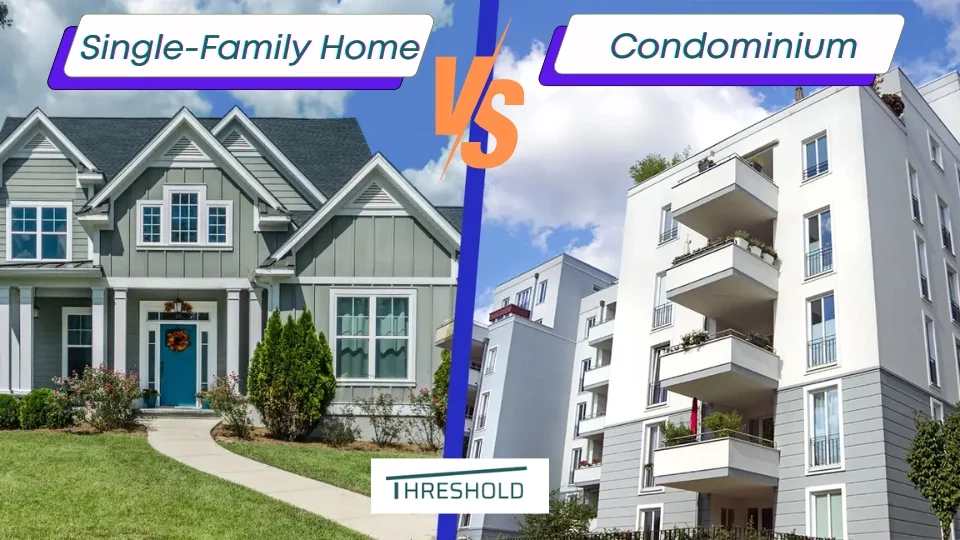The market for rental properties is expanding rapidly, thus offering many opportunities for property investors. In this game, single-family homes and condos are two prominent options. The point is, though, handling the property is essential! Imagine being in charge of a rental property.

Whether it’s a house or a condo, knowing the subtle distinctions in management is like knowing the secret to success. Let’s investigate why understanding these management differences is like finding a golden key in the world of rental properties.
Condo Rentals and Single-Family Homes: What’s the Difference?
Okay, so what exactly is a condo? Let’s say you own your own apartment and you live there. A condo is a room contained within a larger structure or complex. Although the outside spaces and facilities, such as the gym or pool, are shared by all condo owners, the interior space is yours.
The Role of Homeowners’ Associations (HOAs) in Condo Management
This is the point at which HOAs are relevant. These are condo living’s equivalent of superheroes. They make rules to ensure everything runs properly, oversee the common areas and amenities, and collect fees from each condo owner to pay for upkeep. HOAs play the role of supervising the condo community’s upkeep.
Property Management Responsibilities in Condos
In condominiums, property management entails maintaining common areas and amenities utilized by all tenants.
This includes maintaining areas like the parking lots, lobby, and hallways tidy and clean, as well as making sure that facilities like the gym, swimming pool, and communal backyard are in good working order and available to all tenants.
Impact of HOA Rules on Property Management and Tenant Relations
Now, let’s examine how HOA regulations impact tenant relations and property management more closely. Think of HOA regulations as the domineering elder sibling of the condominium industry. Laws are established about noise levels, pet rules, and even the color of your front door. As a property manager, you may find it more difficult to enforce these restrictions and ensure that renters abide by them.
Additionally, it may cause tension in your connection with tenants if they believe the restrictions are unjust or excessively stringent. Therefore, it’s essential to comprehend and abide by these guidelines in order to maintain everyone’s happiness and the smooth operation of the condo complex.
Advantages of Managing Condo Rentals
Lower Maintenance Responsibilities Thanks to HOA Help
Here’s a benefit: you don’t have to worry about maintenance often when living in a condo. This is so that the homeowners’ association (HOA) may assist with tasks like roof repair and grass mowing. Thus, you can exhale a little easier.
Access to Cool Amenities to Draw in Tenants
Imagine that your apartment has fantastic amenities, including a clubhouse, gym, and swimming pool. These extras can significantly increase the appeal of your property to prospective tenants.
Challenges of Condo Rental Management
Figuring Out HOA Rules and Fees
Here’s the deal with condos: you must abide by the rules and dues established by the HOA. It can occasionally seem like you’re reading a manual of regulations. However, you’ll be set to go once you get the hang of it.
Limited Say in Outside Maintenance and Shared Areas
The fact that you are not entirely in charge of maintaining the common spaces or the outside presents another difficulty. Decisions may affect the entire neighborhood because it’s a common area. Thus, you must collaborate with others and strike a balance.
Comparing Condo Rentals and Single-Family Homes Management
Investment Strategy and ROI
Okay, let’s go right to the financial aspect of things. You need to know what sort of return you may anticipate when investing in single-family homes or condos. Is this investment going to bring in a sizable sum of money?
Analysis of Investment Potential
Condos, particularly those in well-known locations, may provide a consistent flow of rental income. However, if the community is expanding, single-family homes may offer you better rental income as well as future appreciation possibilities.
Considerations for Long-Term Growth
Let’s now discuss the long term. The value of both kinds of properties can rise over time, but it will rely on a number of variables, including location, market trends, and level of maintenance. Consider your future goals and how all investments fits into them as you consider your options.
Tenant Demographics and Market Demand
Now let’s discuss who resides where and what they need in particular! We will discuss the kind of people that typically term single-family homes and condos “home sweet home.” We’ll also give you a sneak glimpse at what’s trending in both kinds of rentals.
Typical Tenant Profiles
Who’s rapping on the door now? Well, young professionals or couples are drawn to condos. They adore the shared amenities, which include gyms and pools, and the urban vibe. However, single-family homes are more common among families with children or pets. They long for the seclusion and room that these stand-alone homes provide.
Trends in Rental Demand
What’s the rage in the world of rentals? Demand for condos is booming, particularly in urban locations where individuals want to be near the action. The demand for condos rises with the size of cities. Single-family houses, however, are still in great demand; this is particularly true in suburban areas wherever families desire space to grow and establish roots.
Legal and Regulatory Considerations
You have to follow the guidelines whether you’re managing single-family houses or condominiums. Knowing the legal landscape is essential to maintaining the smooth operation of your rental business, from municipal legislation to zoning rules.
Respect for Local Laws:
Each city or municipality has its own set of regulations regarding rental properties. These laws address matters such as eviction procedures, tenant rights, and safety standards. Keeping abreast of these regulations is crucial in order to prevent legal issues.
Zoning Regulations
Zoning regulations set forth the permitted uses of properties in various zones. For instance, although some areas permit mixed-use or commercial activity, others may only be designated for residential use. Verify that the rental property complies with the local zoning laws.
HOA Rules
You must also follow the guidelines established by the homeowners’ association (HOA) if you are managing a condominium. These guidelines may address everything from outside remodeling to noise levels. Understanding HOA rules is essential since breaking them may result in fines or other consequences.
Financial Considerations: Condo Rentals vs. Single-Family Home
Knowing the financial aspect of managing rental homes is essential. This can be divided into two sections: a comparison of continuing costs and their impact on your net rental income.
Comparison of Ongoing Expenses:
Condos: Generally speaking, HOA fees are associated with condos. To keep the common areas immaculate, you pay a monthly membership fee similar to that of
a club. These fees cover the pool’s upkeep, landscaping, and other common facilities.
Single-Family Homes: At this point, you are in charge of your single-family home. This implies that you are paying for all maintenance expenses. It’s up to you, from mowing the grass to repairing leaking faucets.
Impact on Net Rental Income:
Condos: Your total costs may appear a little higher because you are responsible for the HOA dues. But wait, these payments also cover a lot of the maintenance. Therefore, even if you’re spending a little more money each month, you can end up saving money over time by avoiding large, unexpected maintenance expenditures.
Conclusion
Finally, it’s critical to emphasize the main differences between managing single-family houses and condo rentals. Due to HOA engagement and access to great amenities, condos require less maintenance, but managing HOA rules is a difficulty. Conversely, single-family homes offer greater freedom over management choices, but they also come with more responsibility for marketing and upkeep.
**Single-Family Homes:** Nowadays, you have to pay for everything when you live in a single-family home. Yes, every minor fix and improvement costs money out of your wallet. Without those HOA dues, your monthly expenses may be lower, but you still need to save money for unforeseen emergencies.
Choosing the best investment ultimately comes down to your own objectives and skills. Condos can be your thing if you appreciate amenities and prefer less upkeep. Single-family homes, however, can be the better option if you’re in the market for more control and don’t mind taking on more obligations.
Recall that there isn’t a one solution that works for everyone, so before acting, carefully consider your options and speak with professionals. Happy investing!
Condo Rentals and Single-Family Homes: Which Properties Are Easier To Manage?
Are you considering becoming involved in the rental property market as an investor? Fantastic! In this world, single-family homes and condominiums are the two main actors. The problem is that managing them is a little different. It’s crucial to understand these distinctions before you dive into a critical investment decision, for this reason. I promise, it will spare you trouble in the future!
FREQUENTLY ASKED QUESTIONS
Can you manage a condo rental independently, or do you need a property manager?
If you’re willing, you can definitely run a condo rental on your own! It is contingent upon your level of time and effort commitment. Self-management may be effective if you’re excellent at responding to maintenance requests, tenant complaints, and HOA regulations. If, however, you would prefer that someone else take care of the minute aspects, a property manager can be your best option.
What are the main differences in managing condo rentals versus single-family homes?
Taking care of shared amenities and restrictions with HOAs is a common part of managing condos. Although you won’t be entirely in charge of maintenance, you will still have less influence over it. You’re in charge of everything in single-family houses, including tenant relations and repairs. You have greater control over how things are done, but it requires more work.
How do HOA fees impact condo rental management?
A significant portion of condo management is HOA fees. They take care of things like upkeep of shared spaces and facilities. That reduces your profits even though it’s excellent because it means you have less work to do. In addition, you have to accept any modifications or cost increases from the HOA, which might be annoying.
What are the challenges of managing a single-family home rental?
Taking care of single-family homes has unique difficulties. All upkeep and repairs are your responsibility, and they can grow expensive. Plus, you’re on your own to recruit and maintain quality tenants. It’s challenging and comes with a lot of responsibility, but it can also be rewarding if you’re up for it.
What are the advantages of investing in single-family homes over condos?
Purchasing a single-family house allows you to have greater control over property management. Decisions do not need to be approved by the HOA before they may be made. In addition, single-family houses are in high demand in the rental market and tend to rise in value over time. They are therefore, a good option if you’re searching for long-term growth potential.




